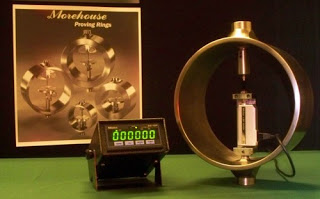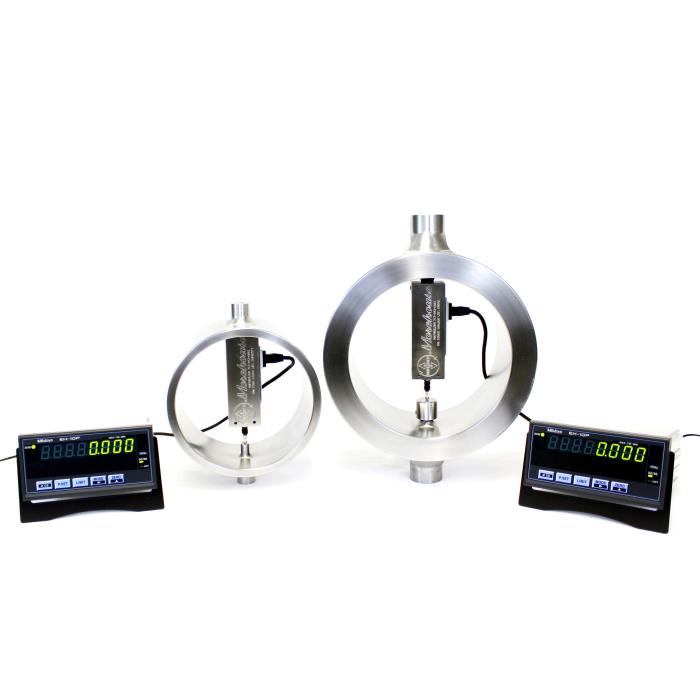Proving Ring Tare Load Correction Proof

This blog post is on the strange side. I was rummaging through some of the work I did back in 1999 and found a proving ring tare load correction proof. I probably never published it as we were all waiting for the world to end at the turn of the next century. When the world did not end, I forgot about it and moved on to other things. This proof was done using a 6,000.00 LBF Capacity Proving Ring S/N 7232 on July 9, 1999. The purpose of this blog is to share the correction and proof for anyone using Digital or Analog Morehouse Proving Rings.

Morehouse Digital Proving Rings
Proving Ring Tare Load Correction Using Computed Load Tables
1. Exercise the Proving Ring and take readings to determine the tare load and record the Proving Ring temperature.
0.0 div. Ring no load reading before application of tare load
98.2 div. Ring reading for calculation of tare load
0.15div. Ring no load reading after application of tare load
23.5O C Ring temperature
2. Calculate average no-load reading for the tare load.
0.0 div. Ring no load reading before application of tare load
+0.15 div. Ring no load reading after application of tare load
0.15/2 = 0.075div. Average no load reading to calculate tare load
3. Determine net deflection for tare load.
98.20 div. Ring reading for calculation of tare load
- 0.075 div. Average no load reading to calculate tare load
98.125 div. Net Ring deflection to calculate tare load at 23.5
4. Compensate net Ring deflection of tare load for temperature.
98.125 div. Net Ring deflection to calculate tare load at 23.5
- .075 div. Correction to 23 using the formula in Operation and Maintenance Instructions For Proving Rings manual.
98.1135 div. Net Ring deflection to calculate tare weight at 23.5
5. Determine the weight of tare load from computed load table.
98.1135 div. Net Ring deflection to calculate tare load at 23
98.1135div. = 299.70 lbf interpolation from load table
98.1135 div. = 299.70 lbf force of tare load*
6. Exercise the Proving Ring and take readings for the applied load.
98.20 div. Ring reading with only tare load applied before application of load
1105.05 div. Ring reading with applied load including tare load
98.30div. Ring reading with only tare load applied after application of load
23.5O C Ring temperature
7. Calculate average no load reading for the applied load.
98.20 div. Ring reading with only tare load applied before application of load
+ 98.30 div. Ring reading with only tare load applied after application of load
196.50/2 = 98.25 Average no load tare reading for the applied load
8. Determine net deflection for applied load including the tare load.
1105.05 div. Ring reading with applied load at 23.5
- 98.25 div. Net Ring Deflection to calculate tare at 23.5
1006.8 div. Change in Net Ring deflection
9. Compensate net Ring deflection of the load for temperature.
1006.80 div. Net Ring deflection including tare at 23.5
- 0.13 div. Change in Net Ring deflection
1006.67 div. Net Ring Deflection Including Tare Load
Proving Ring Tare Load Correction using Tare Load Correction Factor
The following is an example that uses a formula to correct for tare loads. The tare load correction formula corrects for tare and is applied to the value of the applied load from the fitted curve data provided with your calibration report. The tare load correction formula is represented as follows: TCF = (2c * L * T) - a
Where: c = The value of the c constant found on the ring calibration report
L = The force of the load being applied
T = The force of the tare being applied
a = The value of the constant found on the ring calibration report
Calibration Report Data: c = 0.2648421D-05
L = 3,000.00
T= 299.70 Lbf
a = 0.1673432D+00
TCF = (2*0.2648421D-05*3000*299.70)-0.1673432D+00
TCF = 4.595 div
3,000 LBF = +1002.050 div. From table
1006.645 div. Correction for tare
Difference between TCM and Tare Load Correction Using Computed Load Tables
TLC =1006.670 div.
TCM = -1006.645 div.
Difference = 0.025 div.
The difference is below the readability of the proving ring which is 0.05. Therefore, using the Tare Load Correction Formula introduces an insignificant amount of error and can safely be used to correct for the tare.
We have made Excel spreadsheets for anyone using a proving ring as a calibration standard in our Morehouse UCM. The Excel sheet handles temperature, tare, and other corrections to set to the appropriate force values.
Proving Ring Tare Load Correction Proof - Conclusion
If you enjoyed this article, check out our LinkedIn and YouTube channel for more helpful posts and videos.
Everything we do, we believe in changing how people think about force and torque calibration. Morehouse believes in thinking differently about force and torque calibration and equipment. We challenge the "just calibrate it" mentality by educating our customers on what matters, and what causes significant errors, and focus on reducing them.
Morehouse makes our products simple to use and user-friendly. And we happen to make great force equipment and provide unparalleled calibration services.
Wanna do business with a company that focuses on what matters most? Email us at info@mhforce.com.
#Proving Ring Tare


